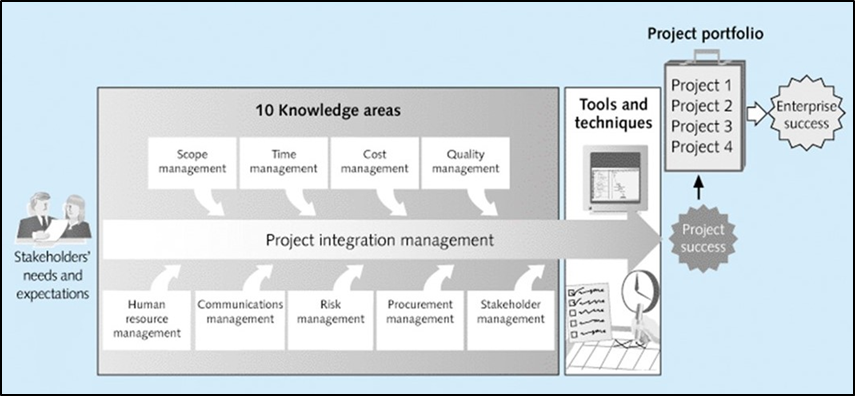The Project Management Framework
Introduction
Project management frameworks are efforts to understand the scope of a project and project management topics in a holistic sense. They go beyond the constraints discussed above to include all aspects that may influence a project. Schwalbe offers the following framework:
- Stakeholders' needs and expectations
- Project management knowledge areas
- Tools and techniques
- Project portfolios
Schwalbe illustrates the relationships between these various aspects of the project management framework in Figure 1-1 below.

Click for a text description of Figure 1-1
This figure shows how the ten project management Knowledge Areas, represented as boxes arranged horizontally, reflect the needs and expectations of stakeholders and support successful project planning and execution. These knowledge area boxes: Scope, Time, Cost, Quality, Human Resources, Communications, Risk, Procurement, and Stakeholder Management have arrows that connect to a central arrow labeled as "Project Integration Management". Through the use of project integration management tools and techniques, these "Knowledge Areas" come together in project planning and execution to deliver project success--full completion of the scope within planned time and resources. Project success, represented as a circular symbol, connects to a box called listing multiple projects in an organization's "project portfolio" to deliver "enterprise success" represented as a circular symbol.
Each of these components is described below. The components of the framework are briefly described below and explained in more detail in Schwalbe Chapter 1.
Stakeholder Needs and Expectations
Stakeholders can be anyone or any organization that has an interest or involvement in the project. The term "stakeholder" is normally used in a general sense to identify people or organizations that will have some role in a project (e.g., review or approval of project deliverables) or which are more broadly impacted by the project work or results (e.g., employees or management personnel inside the organization carrying out the project). The group or organization which sponsors a project and expects to derive benefits from project results may be considered "customers". Project results and tangible deliverables should focus on the customers' business requirements, which are work assignments and associated resource needs necessary to support an organization's mission and goals.
Project Management Knowledge Areas
As described by the Project Management Institute (PMI), project management Knowledge Areas address critical concerns and practices that must be taken into account in project planning and execution. The PMI Knowledge areas are:
- Core knowledge areas
- Scope management
- Time management
- Cost management
- Quality management
- Facilitating knowledge areas
- Human resources management
- Communication management
- Risk management
- Procurement management
- Stakeholder management
- Integrative knowledge areas
- Project integration management
A look at our syllabus reveals much of the class is organized based on these knowledge areas. It is not possible to create a project plan without a detailed look at the plan's scope, timing, and cost. In addition to these, we will discuss all of the other important knowledge areas you must be familiar with to be a successful project manager.
Tools and Techniques
Tools and techniques can help to increase understanding in any of these knowledge areas, but are most vital in the core knowledge areas. We will explore a variety of these techniques and discuss their implementation in GIS projects. Although project management software packages can facilitate the use of these tools and techniques, the same techniques have long been used with pencil and paper.
Project Portfolios
A project portfolio is a collection of projects that are grouped together to facilitate effective management of work to meet the projects' objectives). Project portfolio management integrates the planning and management of individual projects into a larger entity that can be aligned with an organization's mission and business requirements. The process is similar to investment portfolios that look at all holdings and attempt to achieve a balance between risk and potential reward.